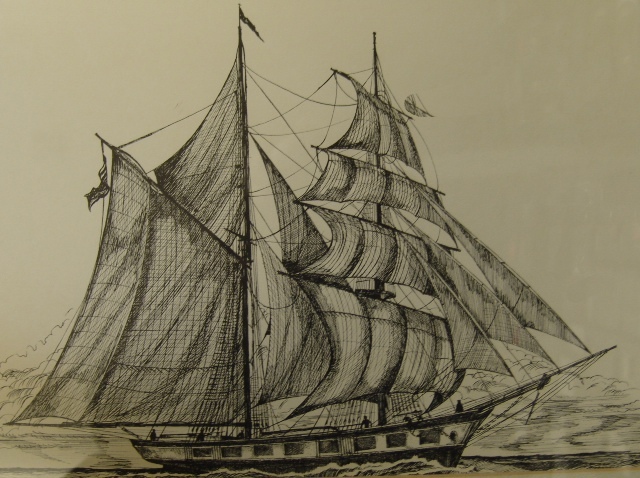This year marks the 200th anniversary of the War of 1812, and the Freeport Historical Society is paying tribute with a special program on May 6 titled, “Free Trade and Sailors’ Rights — The War of 1812.” The town has significant connections to this often overlooked conflict in our nation’s history.
Though we had won our independence from Great Britain nearly 29 years earlier, with the conclusion of the Revolutionary War, the Royal Navy still ruled the seas. Britain sought to choke the young United States with an economic blockade of our coastline, an effective strategy that kept American exports from leaving the country.
It wasn’t long before another war was inevitable.
As a prominent shipbuilding town, Freeport entered the fray in 1813 with the building of a sleek vessel named Dash that could not only evade British patrols, but was tasked with capturing British vessels and seizing their cargo. The Dash was what was known as a privateer, a privately owned vessel sanctioned by the U.S. government to carry out a form of legalized piracy.
To illustrate this murky backdrop, where smuggling on both sides was rampant, the historical society has invited Dr. Joshua Smith, author of “Borderland Smuggling: Patriots, Loyalists and Illicit Trade in the Northeast, 1783-1820.”
“Dash was a very successful vessel until it disappeared in a storm in 1815 and was lost with all hands,” Smith said.
About a dozen of the crew were from Freeport, including members of the Porter family — the ship was built at Porter’s Landing on the Harraseeket River.
The Dash was successful in breaking the British blockade of Portland and made several quick runs to the West Indies, where it exchanged lumber and other local crops for profitable cargos such as coffee and sugar cane. On one voyage, the Dash recaptured an American sloop taken by the British as well as a British ship. Near Portland on the return voyage, the Dash had to fight a fleeing enemy schooner.
The vessel was certainly a source of pride for the area. Its likeness is inscribed in the plaster of a house at the historic Pettengill Farm, which the historical society owns. The Dash never let a chase escape; it was never damaged by a hostile shot. It was one of the most successful privateers of the War of 1812; its record was never equaled.
Smith said the sea was a hostile place at the time. The British were seizing American vessels and then forcing American crew to fight for the British. It’s interesting that Americans continued to live in fear of the British decades after the revolution.
During the War of 1812, accounts state Britain had nearly 100 warships in U.S. waters, while the U.S. Navy had a fleet of only about 20. With an abundance of raw materials, like the King’s Pine and a wealth of shipbuilding knowledge, one wonders why our young nation couldn’t build a navy capable of defending our coastline. Smith said the answer was simple.
“In a word it was taxes,” Smith said. “The ruling Jeffersonian party was allergic to taxation and was also very suspicious of a large standing military. Even though everyone knows we’re going to war in early 1812 before it’s officially declared, Congress refuses to enlarge the U.S. Navy. The strategy instead was to beat up the British by marching into Canada with militia, which cost almost nothing.”
Maine was a pivotal territory around all this. The Brits stood to gain a lot in 1814 when they captured Bangor, Castine, Hamden and Machias, since the boundary between New Brunswick and the District of Maine had never been adequately agreed to after the revolution.
One can imagine discussions at Jameson Tavern on Freeport’s Main Street 200 years ago, which served as a local meeting spot where prominent travelers on a stagecoach line from Portland to Augusta would meet.
The program will be at the society’s headquarters, 45 Main St., May 6 at 1:30 p.m. Admission is $5.
Don Perkins is a freelance writer who lives in Raymond. He can be reached at:
presswriter@gmail.com
Copy the Story Link
Send questions/comments to the editors.



Success. Please wait for the page to reload. If the page does not reload within 5 seconds, please refresh the page.
Enter your email and password to access comments.
Hi, to comment on stories you must . This profile is in addition to your subscription and website login.
Already have a commenting profile? .
Invalid username/password.
Please check your email to confirm and complete your registration.
Only subscribers are eligible to post comments. Please subscribe or login first for digital access. Here’s why.
Use the form below to reset your password. When you've submitted your account email, we will send an email with a reset code.